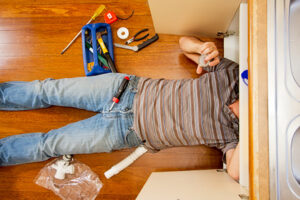
Plumbing inspections are an important service for new homeowners to ensure that their new home doesn’t have any nasty surprises.
Buying a new home is an exciting milestone, but it comes with its share of responsibilities and challenges. One of the most crucial aspects of homeownership is ensuring that your new investment is in top condition, and this includes the plumbing system. Plumbing inspections are often overlooked by new homeowners, but they are essential for preventing costly repairs and ensuring the long-term health of your home. This blog will guide you through everything you need to know about plumbing inspections, why they matter, and what to expect during the process.
Why Plumbing Inspections Are Important
When purchasing a home, many buyers focus on the aesthetics, location, and overall condition of the property. However, the plumbing system is one of the most critical components that often goes unnoticed. A thorough plumbing inspection can reveal hidden issues that might not be apparent during a general home inspection. These issues can range from minor leaks to major problems like corroded pipes or sewer line blockages.
- Preventing Costly Repairs: The primary reason for conducting a plumbing inspection is to avoid unexpected expenses down the line. Plumbing problems can be expensive to fix, especially if they go unnoticed for an extended period. Identifying potential issues early can save you thousands of dollars in repairs.
- Ensuring Safety: A faulty plumbing system can pose safety risks to your home and family. Leaking pipes, for example, can lead to mold growth, which can cause health problems. Additionally, issues like gas leaks from water heaters can be hazardous if not addressed promptly.
- Peace of Mind: Knowing that your plumbing system is in good condition provides peace of mind. You can move into your new home with confidence, knowing that you won’t be facing any plumbing-related surprises.
What Does a Plumbing Inspection Involve?
A comprehensive plumbing inspection covers various aspects of your home’s plumbing system. Here’s what you can expect during the process:
- Visual Inspection of Pipes and Fixtures: The inspector will start by visually inspecting all accessible pipes, faucets, and fixtures. They will check for signs of leaks, corrosion, and damage. This includes examining the condition of the pipes under sinks, behind appliances, and in the basement or crawl space.
- Water Heater Inspection: The water heater is a critical component of your plumbing system. The inspector will check its age, condition, and whether it is operating efficiently. They will also ensure that the temperature and pressure relief valve is functioning correctly, as this is a crucial safety feature.
- Checking Water Pressure: Proper water pressure is essential for the efficient operation of your plumbing system. The inspector will measure the water pressure to ensure it is within the recommended range. Low water pressure can indicate a problem with the supply line, while high pressure can cause damage to your pipes and fixtures.
- Sewer and Drain Inspection: The inspector will examine the condition of your home’s sewer line and drains. They may use a camera to inspect the sewer line for blockages, cracks, or tree root intrusion. Slow or clogged drains can be a sign of a more significant issue that needs to be addressed.
- Inspection of Shut-Off Valves: Shut-off valves are essential for controlling the flow of water to different parts of your home. The inspector will check that these valves are in good working order and can be easily accessed in case of an emergency.
- Water Quality Testing: In some cases, the inspector may recommend testing the water quality. This can help identify issues like hard water, which can cause scale buildup in pipes and appliances, or contamination from lead or other harmful substances.
- Checking for Proper Venting: Proper venting is crucial for the plumbing system to function correctly. The inspector will ensure that vents are installed correctly and are free from obstructions.
When Should You Schedule a Plumbing Inspection?
Ideally, a plumbing inspection should be conducted before you finalize the purchase of your new home. This allows you to negotiate repairs or adjustments with the seller if any issues are found. However, if you have already purchased your home, it’s never too late to schedule an inspection, especially if you notice any signs of plumbing problems, such as slow drains, unusual noises, or water stains on walls and ceilings.
Call Mahon Plumbing Today
If you still have more questions regarding your plumbing, we here at Mahon Plumbing are here to help. We have been serving the wider Baltimore area since 1994, so we have 25 years of experience to back up our fantastic service! Call us at our Baltimore location at 410-766-8566 or our Pasadena location at 410-636-7944. Be sure to keep up with us on social media by following us on Facebook or Twitter.
